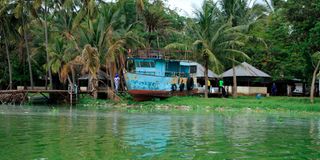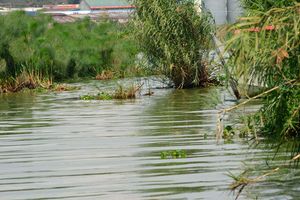Why the foul smell from Lake Victoria is here to stay

Lake Victoria covered by algae near Kisat River mouth.
What you need to know:
- Lake Victoria, which is Africa’s largest freshwater lake and world’s second largest freshwater body after Lake Superior in North America, has been choking with pollutants ranging from domestic to industrial waste; resulting in discoloured waters, persistent pungent and irritating smell emanating from the water body.
- According to the locals and fishermen who frequent the lake, the smell often becomes unbearable whenever it’s windy and temperatures are high.
Researchers have warned that the choking smell from Lake Victoria will continue to be a nuisance to the locals if pollution in the water body persists.
Lake Victoria, which is Africa’s largest freshwater lake and world’s second largest freshwater body after Lake Superior in North America, has been choking with pollutants ranging from domestic to industrial waste; resulting in discoloured waters, persistent pungent and irritating smell emanating from the water body.
According to the locals and fishermen who frequent the lake, the smell often becomes unbearable whenever it’s windy and temperatures are high.
Dr Christopher Aura who heads the Kenya Marine and Fisheries Research Institute (KEMFRI) Kisumu branch said the foul smell is due to the gasses being emitted in the lake during decomposition of waste.
“Decomposition will continue as long as the lake still has more algae, we should therefore expect the smell to persist. Continuous pollution has led to the lake increasingly becoming fertile; leading to increased algae (the green and brown matter on the lake surface) also referred to as algal bloom,” she says.
When the temperatures rise, the algal matter begins decomposing while utilising oxygen, which poses a threat to caged fish. In the process of decomposition, ammonia and hydrogen sulphide gases are emitted as by-products; leading to the stinking smell.
A tour along the beaches in Kisumu reveals a changing water colour from clear to green and brown accompanied by an increasing foul smell. The smell worsens a few meters from River Kisat, one of the rivers emptying its water into the water body that is bordered by three countries.
“During the rainy or cold seasons, the temperatures are low and bacteria are less inactive so the smell might go unnoticed. However, when the temperatures rise, the organic matter starts decomposing, which in turn emits the smell,” offers a Kisumu-based researcher.
The choking smell from the freshwater lake was first reported last year by fishermen and residents living along the beaches in Kisumu and Homa Bay Counties.
This was later accompanied by massive death of caged fish; with farmers losing up to 135 cages in 10 beaches across the two counties.
In March, the cage fish farmers suffered yet another major blow following another major fish kill at Ogal beach in Kisumu.
The deaths had resulted from algae concentration at the cage site, which are undergoing decomposition, and utilising oxygen in the water causing low levels of dissolved oxygen as explained by the fisheries researchers.
“The thick layer of algal blooming at the site is a sign of increased water pollution, whose decomposition may have lowered dissolved oxygen levels, the nets surrounding the cages had also been clogged limiting water circulation,” said Dr Aura during a briefing last year.
In a report released last year, Dr Aura had shared that algae coverage in the lake was at 6,000 hectares while hyacinth covered 4,000 hectares.
Mr John Ochieng, one of the fishermen based in Dunga beach, observed that hippopotamuses, crocodiles and other aquatic animals avoid the polluted beaches.
“When fishing, we try as much to avoid the polluted area due to the stench and even in the rare occasions that we go, we are sure to leave with nothing,” he shared.
He, however said that consumption of fish from the lake does not pose any health risk. “Research had been conducted on the fish and the findings confirmed that the toxins concentration is still low. "
The emitted gases, according to Dr Aura, may not have any significant effect on respiration because the concentration is not to the saturation point.
In April, Kisumu Governor Peter Anyang’ nyong’o issued a statement warning companies against emitting raw effluent into Lake Victoria.
He said some industries have been pumping raw effluents into the lake and surrounding rivers despite the activity posing an environmental threat.
Prof Nyong’o said that continuous pollution was one of the reasons behind the recent massive deaths of fish reported in Lake Victoria.





